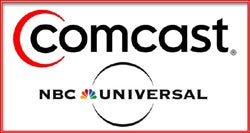(Also see: "Comcast Starts Integration With NBCU")
Comcast and NBC Universal told the Federal Communications Commission on Thursday that their $30 billion deal should be approved because it would increase “the quantity, quality [and] diversity” of programming and would “accelerate the innovative ‘anytime, anywhere’ future Americans want.”
In a 135-page filing, the companies called their agreement “pro-competitive” and said that “there is no plausible basis” for contrary claims. They argued the deal would create “new opportunities to better serve” consumers, “increase the quality and quantity of programming” while presenting “no cognizable competitive harm.”
The Justice Department is reviewing anti-trust implications of the deal while the FCC reviews “public interest” impacts.
Comcast and NBC also provided offered more details about concessions they are offering the FCC:
 * NBC will adopt the cable industry’s standard for displaying program ratings, meaning ratings logos will be larger and air for 15 seconds after every commercial break instead of 5. Comcast will also promote Common Sense Media’s media literacy and ratings efforts.
* NBC will adopt the cable industry’s standard for displaying program ratings, meaning ratings logos will be larger and air for 15 seconds after every commercial break instead of 5. Comcast will also promote Common Sense Media’s media literacy and ratings efforts.
* NBCU’s 10 NBC owned stations will commit to not only keeping current levels of news programming but to air 1,000 more hours each year, though not all would necessarily air on the main local channel. The companies called NBC News “one of the crown jewels” of NBCU and said far more news programming will be made available on video on demand services available to Comcast subscribers.
* The company will add an hour of children’s programs in each market it has a station, airing the extra hour on a local multicast station, not its main station. The company will also make far more children’s programming available from video on demand services.
* Telemundo will begin airing another Hispanic channel with different programming for use on multicast channels, adding to the programming it now provides on Telemundo and mun2. More Hispanic programming will also be added to video on demand services.
Some consumer groups and unions have warned the deal could lead to cable-like charges to access now free internet video and could potentially give Comcast too much control over programming, hampering the growth of cable alternatives.
Both companies argued that their deal would benefit consumers — and improve competition — without impacting media consolidation because Comcast owns no TV stations and few cable channels. They also said there is plenty of Web competition and the combination would have a relatively small share of Web video.
“NBCU and Comcast will be stronger, more effective players in video programming and distribution, spurring other content providers and distributors to invest and innovate, thereby enhancing competition,” said the filing, noting that Comcast has sometimes had problems winning deals for video on demand rights from movie studios.
They also said that the transaction would strengthen NBC Universal in confronting the “turbulent” media marketplace where broadcast networks and affiliates “face unprecedented challenges in the continuing vitality of their business models.”
With the deal, they said Comcast “has strong incentives — and the ability — to grow the broadcast business” and cited sports and women’s programming as among growth targets.
“By combining the NBC network with Comcast’s national sports cable networks, new opportunities will be created for the combined entity to negotiate for broader rights packages,” the companies said.
They added that NBCU’s interest in Oxygen and iVillage together with Comcast’s E! and Style networks and Daily Candy website would provide “ability and incentive” to expand programming that could be shared.
They also suggested the combination would “foster innovation by accelerating the ‘new media’ future of in-home and mobile entertainment.”
“Marrying NBCU’s programming assets with Comcast’s multiple distribution platforms will make it easier for the combined entity to experiment with new business models that will better serve consumers,” the companies said.
Supporters and opponents of the deal now get to comment on the deal. Meanwhile Congress is holding hearings, the first of which is Feb. 4.
Comcast and NBCU are hoping to close the deal in the fourth quarter of this year.


